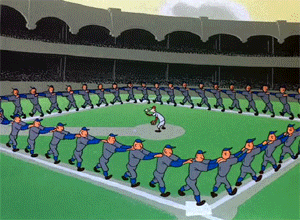What would the Yankees’ record be if their performance with runners in scoring position was on par with recent seasons? With a few key hits at the right moment, the Yankees could be resting comfortably in first place, but so far this season, the team hasn’t been able to land the big blow with the same amount frequency. And, in no situation has that been more evident…and costly…than when the Yankees have loaded the bases.
Yankees Offensive sOPS+ Rates, 1996-2012

Note: sOPS+ compares a team’s split to the adjusted average for the major leagues. A reading above 100 is considered above average for an offense.
Source: baseball-reference.com
Entering play on Wednesday, the Yankees ranked near the bottom of the major leagues in terms of batting average, on-base percentage, and slugging (.151/.222/.302) with the bases full. Based on OPS, not only does that performance rate fail to attain even 50% of the major league average, but it also ranks as the franchise’s third lowest output since 1948. Also, the differential between the team’s overall offensive production and its performance with the bases loaded is currently larger than at any point over the same timeframe.
Clearly, the Yankees have been laggards with the bases loaded, but is this really a bad harbinger? Based on correlation from 1996 to now, the Yankees’ performance with the bases loaded has only been moderately related to overall run production as a percentage of the league average (r=.62). Meanwhile, the link between relative runs scored and OPS with men in scoring position has been more significant (r=.78). So, if anything, fans who are inclined to worry should focus their concerns on the more broad number.
Yankees’ Bases Loaded vs. Overall OPS, 1948-2012

Source: baseball-reference.com
It hasn’t been all bad news for the Yankees with the bases loaded. While the hitters have struggled in such situations, the pitching staff has done a good job wiggling out of trouble when the bags are jammed. In 42 plate appearances with the bases loaded, opposing hitters have produced at rates of .263/.262/.368 (sOPS+ of 76), including 13 strikeouts and only one walk. It might only be a small consolation, but at least Yankees’ pitchers have been able to offset some of the offense’s missed opportunities by imposing the same frustration on the opposition. Unfortunately, since 1996, there has been no correlation between the Yankees’ ability to limit the damage in bases loaded situations and prevent runs overall (r=.04), so there doesn’t seem to be much benefit from that guilty pleasure.
Yankees Pitching sOPS+ Rates, 1996-2012

Note: sOPS+ compares a team’s split to the adjusted average for the major leagues. A reading below 100 is considered above average for a pitching staff.
Source: baseball-reference.com
An optimist probably looks at the Yankees’ ability to hang around first place despite its offensive struggles with runners in scoring position as a positive sign. Meanwhile, the pessimist might consider the offense’s inefficiency to be a systemic problem that will prevent the team from outscoring the deficiencies of the starting rotation. Which side are you on? I take a little from both. The lineup’s track record suggests the Yankees’ offense will soon start making up ground on the past, but it won’t matter if they can’t stay ahead of the current opposition. A few more hits with the bases loaded would definitely be nice, but the real loaded question is whether the pitching staff can ensure that those runs will be meaningful when they finally cross the plate.






















